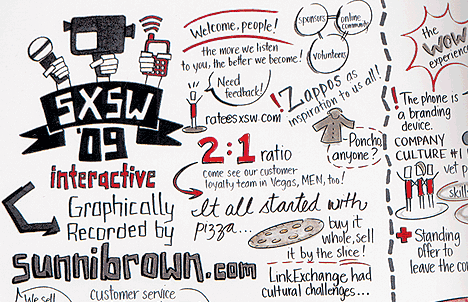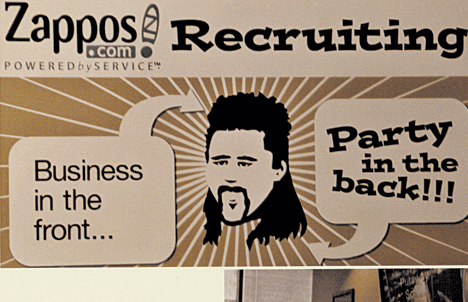At Zappos, Culture Pays
The thriving Internet shoe retailer has made its name and a lot of money by being eccentric.
(originally published by Booz & Company)One clue that something a little weird is happening at Zappos can be found near the bottom of the home page of the company’s website, where you’ll find lists with headings such as “Shop with Us” and “Customer Service,” beneath pictures of Anne Klein, Rockport, and Nike footwear; New Balance shirts; and Tommy Bahama shorts. Buried in one list is a link advising, “Don’t ever click here.” I did, of course, and the link opened a YouTube video of the Muppet rock band performing, as lead singer Beaker lip-syncs, “Never gonna give you up. Never gonna let you down.” It is a not-so-subtle message to Zappos’ customers and perhaps to its employees as well.
Another link opened a company-produced video in which employees talk about their favorite Zappos values — there are 10 values in total — with the same conviction and enthusiasm that the Muppet band brings to its musical antics. A clear winner: “Create fun and a little weirdness.”
Weirdness may not be the first thing that comes to mind when you think of shoe retailing, but then again neither are things like innovation, massive growth, or a large payoff from a huge acquisition. All of those apply to Zappos, however, where a little weirdness — combined with faith that putting extraordinary effort into building a desirable company culture — has provided a sure path to business success.
Zappos began selling shoes and other products online in 1999, became profitable four years later (the beginning of a still-unbroken run of annual earnings gains) and reached more than US$1 billion in sales by 2009. That was a big year for Zappos in other ways as well. The company was rewarded with Business Week’s Customer Service Champ designation, inclusion on Fortune’s list of the 100 Best Companies to Work For, and an A+ rating by the Better Business Bureau. Also in 2009, Amazon purchased Zappos for 10 million Amazon shares, worth almost $928 million at the time. Zappos’ employees divvied up $40 million in cash and restricted stock and were given assurances that the Zappos management would remain in place.
At the top of the list of Zappos’ values is “Deliver WOW through service.” In fact, Zappos describes itself as a service company that happens to sell shoes and other products. This value is reflected in such niceties as a 365-day return policy with free shipping both ways, 24/7 customer phone lines, live online help, and customer product ratings — none of which is all that weird. But things do become, if not weirder, then at least different, when seen from the perspective of Aaron Magness, Zappos’ director of business development and brand marketing. He told me, “I read about how Zappos is focused on customer service. It isn’t. It’s focused on company culture, which leads to customer service. We don’t talk about customer service; we allow it to happen on its own by having the right people.”
The right people are rare. Only about one out of 100 applicants passes a hiring process that is weighted 50 percent on job skills and 50 percent on the potential to mesh with Zappos’ culture. Indeed, if you want to get a job at Zappos, the value to emblematize most is “be humble” — avoid using I in favor of we. “Humbleness allows for greater collaboration,” says Magness, sounding more and more like a self-help manual all the time.
Acing the interview process isn’t enough to guarantee continued employment. Every new hire undergoes four weeks of training, during which the company culture must be committed to memory. The second week includes dealing with customers by working the telephones. One newly hired senior person thought this task beneath him. He was treated like the apostate that he was. “We sent him home,” Magness offers bluntly.
The architect of Zappos’ determination to build a culture that applauds such things as weirdness and humility is Tony Hsieh (pronounced Shay), who became CEO in 2000. He would stand out as a little weird himself in a room full of CEOs: He shaves his head, spends at least 10 percent of his time studying what he calls the science of happiness, and speaks of becoming less focused on “me.” As an April Fools’ Day prank this year, Hsieh put out a press release announcing that Zappos was suing Walt Disney Company in a class action claiming that Disney was misleading the public by saying that Disneyland is “the happiest place on Earth”; clearly, Hsieh argued, Zappos is.
As cofounder of the Internet advertising network LinkExchange and of an incubator firm that invested in Web startups, Hsieh saw firsthand the dysfunction that can arise from building a company in which technical skill is all that matters. He reached a point of not wanting to go to work because of all the backstabbing and ladder climbing he saw — and this was at startup companies, blank slates emerging from revolutionary new technologies. Many of these companies didn’t get very far.
When he joined Zappos, Hsieh was determined that it would be different — that its success would be informed primarily by an unorthodox and comparatively benign culture. He invited Zappos’ 300 employees to list the core values that the culture should be based upon. That exercise, which involved grouping like-minded suggestions together, readily yielded the 10 values that continue to drive the organization, now numbering about 1,800 people.
A far more difficult challenge than defining these values has been keeping them in the foreground of employees’ attention and making certain that abstract qualities such as weirdness and humility are given concrete reality. Hsieh and his management team meet that test in myriad ways. For example, the value “Pursue growth and learning” is supported by a company library and an in-house life coach.
But non-management employees must do their part as well; their performance reviews are based in large part on how well they participate in the culture. “That doesn’t mean you have to be at every [company] happy hour,” Magness says. “But are you living the brand promise? Are you organizing team events? What is your relationship like with outside vendors? How are your relationships with other members of your team?”
Corporate culture is more than a set of values, and it is maintained by a complex web of human interactions. At Zappos, the liberal use of social media facilitates the network that links employees with one another and with the company’s customers. A recent scan of twitter.zappos.com found customers discussing Zappos’ coupons, the attractiveness of Zappos’ pricing, and the company’s “teleportation technology.” As one tweet stated, “I wish Zappos would share [it] with the rest of the world. Ordered shoes at 8 p.m. last night, got here today?” Also on Twitter, employees share advice about shipping procedures and SOS calls: “Hey. Did anyone bring a hairdryer to the office today?”
Zappos takes the pulse of the organization monthly, measuring the health of the culture with a happiness survey. Employees respond to such unlikely questions as whether they believe that the company has a higher purpose than profits, whether their own role has meaning, whether they feel in control of their career path, whether they consider their co-workers to be like family and friends, and whether they are happy in their jobs.
Results from the survey are broken down by department, and opportunities for development are identified and acted upon. For example, when it was clear from the survey that one department had veered off course and felt isolated from the rest of the organization, a program was instituted that enabled individuals in the group to learn more about how integral their work was.
To celebrate its accomplishments, Zappos publishes an annual Culture Book. The 2009 edition is a slickly produced 350-page hardback packed with testimonials from employees, many of whom likened Zappos to a group of prized relatives. Britnee B., an employee since 2008, wrote, “Every day when I come to work, I am overwhelmed with the genuine smiles and happy spirits of my Zappos family.”
In Hsieh’s introduction to the book he asks, “So what is the Zappos culture?” He has several answers, and concludes with, “But most of all, it’s about having faith that if we do the right thing, then in the long run we will succeed and build something great.”
Unlike many of the companies that Hsieh had worked with previously, where technical skill trumped social skills and enervating politics trumped cooperation, Zappos has a belief that the right culture with the right values will always produce the best organizational performance, and this belief trumps everything else. Of course, there is no real proof of the cause and effect, and Magness himself admits that “it takes a leap of faith” to believe it. But that’s a leap that Hsieh has gladly embraced — and so far he’s convinced his employees to jump as well.![]()
Author profile:
- Dick Richards is an organizational change, personal growth, and leadership development consultant, and is the author of Is Your Genius At Work? 4 Key Questions to Ask Before Your Next Career Move (Davies-Black Publishing, 2005).






